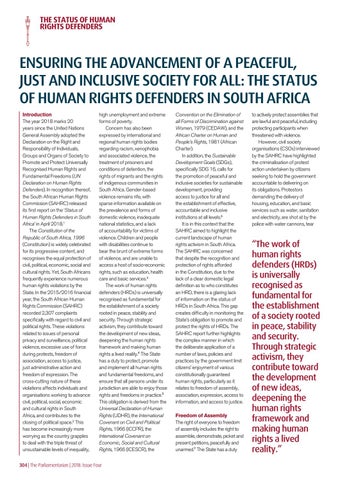THE STATUS OF HUMAN RIGHTS DEFENDERS
ENSURING THE ADVANCEMENT OF A PEACEFUL, JUST AND INCLUSIVE SOCIETY FOR ALL: THE STATUS OF HUMAN RIGHTS DEFENDERS IN SOUTH AFRICA Introduction The year 2018 marks 20 years since the United Nations General Assembly adopted the Declaration on the Right and Responsibility of Individuals, Groups and Organs of Society to Promote and Protect Universally Recognised Human Rights and Fundamental Freedoms (UN Declaration on Human Rights Defenders). In recognition thereof, the South African Human Rights Commission (SAHRC) released its first report on the ‘Status of Human Rights Defenders in South Africa’ in April 2018.1 The Constitution of the Republic of South Africa, 1996 (Constitution) is widely celebrated for its progressive content, and recognises the equal protection of civil, political, economic, social and cultural rights. Yet, South Africans frequently experience numerous human rights violations by the State. In the 2015/2016 financial year, the South African Human Rights Commission (SAHRC) recorded 2,307 complaints specifically with regard to civil and political rights. These violations related to issues of personal privacy and surveillance, political violence, excessive use of force during protests, freedom of association, access to justice, just administrative action and freedom of expression. The cross-cutting nature of these violations affects individuals and organisations working to advance civil, political, social, economic and cultural rights in South Africa, and contributes to the closing of political space.2 This has become increasingly more worrying as the country grapples to deal with the triple threat of unsustainable levels of inequality,
high unemployment and extreme forms of poverty. Concern has also been expressed by international and regional human rights bodies regarding racism, xenophobia and associated violence, the treatment of prisoners and conditions of detention, the rights of migrants and the rights of indigenous communities in South Africa. Gender-based violence remains rife, with sparse information available on the prevalence and forms of domestic violence, inadequate national statistics, and a lack of accountability for victims of violence. Children and people with disabilities continue to bear the brunt of extreme forms of violence, and are unable to access a host of socio-economic rights, such as education, health care and basic services.3 The work of human rights defenders (HRDs) is universally recognised as fundamental for the establishment of a society rooted in peace, stability and security. Through strategic activism, they contribute toward the development of new ideas, deepening the human rights framework and making human rights a lived reality.4 The State has a duty to protect, promote and implement all human rights and fundamental freedoms, and ensure that all persons under its jurisdiction are able to enjoy those rights and freedoms in practice.5 This obligation is derived from the Universal Declaration of Human Rights (UDHR), the International Covenant on Civil and Political Rights, 1966 (ICCPR), the International Covenant on Economic, Social and Cultural Rights, 1966 (ICESCR), the
304 | The Parliamentarian | 2018: Issue Four
Convention on the Elimination of all Forms of Discrimination against Women, 1979 (CEDAW), and the African Charter on Human and People’s Rights, 1981 (African Charter). In addition, the Sustainable Development Goals (SDGs), specifically SDG 16, calls for the promotion of peaceful and inclusive societies for sustainable development, providing access to justice for all and the establishment of effective, accountable and inclusive institutions at all levels.6 It is in this context that the SAHRC aimed to highlight the current landscape of human rights activism in South Africa. The SAHRC was concerned that despite the recognition and protection of rights afforded in the Constitution, due to the lack of a clear domestic legal definition as to who constitutes an HRD, there is a glaring lack of information on the status of HRDs in South Africa. This gap creates difficulty in monitoring the State’s obligation to promote and protect the rights of HRDs. The SAHRC report further highlights the complex manner in which the deliberate application of a number of laws, policies and practices by the government limit citizens’ enjoyment of various constitutionally guaranteed human rights, particularly as it relates to freedom of assembly, association, expression, access to information, and access to justice. Freedom of Assembly The right of everyone to freedom of assembly includes the right to assemble, demonstrate, picket and present petitions, peacefully and unarmed.7 The State has a duty
to actively protect assemblies that are lawful and peaceful, including protecting participants when threatened with violence. However, civil society organisations (CSOs) interviewed by the SAHRC have highlighted the criminalisation of protest action undertaken by citizens seeking to hold the government accountable to delivering on its obligations. Protestors demanding the delivery of housing, education, and basic services such as water, sanitation and electricity, are shot at by the police with water cannons, tear
“The work of human rights defenders (HRDs) is universally recognised as fundamental for the establishment of a society rooted in peace, stability and security. Through strategic activism, they contribute toward the development of new ideas, deepening the human rights framework and making human rights a lived reality.”
